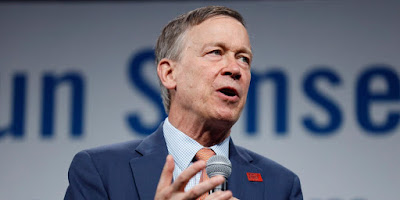Chris Hill was just appointed the George W. Ball Professor at the School of International and Public Affairs (SIPA) at Columbia University. The announcement from SIPA Dean Merit Janow follows:
I am also pleased to share that Ambassador Christopher Hill will serve as the George W. Ball Adjunct Professor at SIPA in Spring 2021. As the George W. Ball Adjunct Professor, Ambassador Hill will teach a course on diplomacy and also deliver the annual George W. Ball lecture, among other activities. His extraordinary foreign policy experience will be of tremendous benefit to our students and intellectual community, and we look forward to welcoming him to SIPA this spring.
Chris was the Dean of the Josef Korbel School of International Studies for 7 years, professor of diplomacy and head of a DU Center of Global Engagement. Chris and I frequently presented on politics, elections and foreign policy.
Congratulations Chris on your Columbia appointment.
 |
| Floyd Ciruli and Chris Hill present a post-election event, Nov. 2016 | University of Denver photo |













